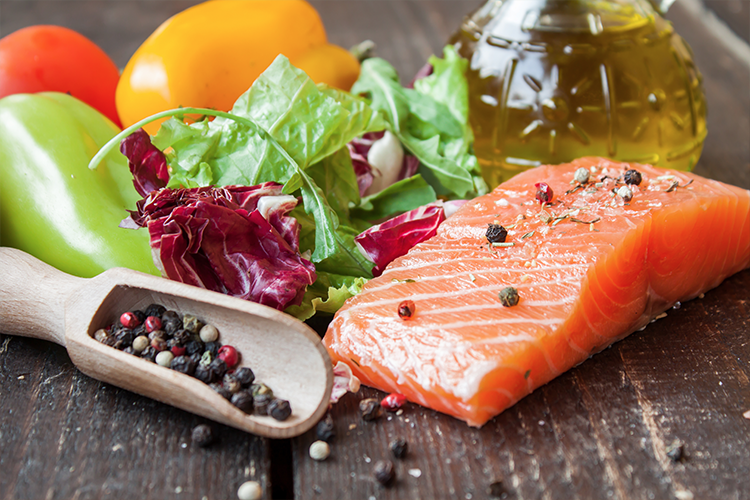Blog
Breast cancer recurrence and the Mediterranean diet

Nona’s diet from the old country is regularly kicking goals for having various health benefits. This includes heart disease, cognitive health, weight loss, metabolic syndrome and longevity.1
We wrote recently on the positive outcomes within the PREDIMED study that a Mediterranean style diet high in healthy fats had on weight loss and reducing waist circumference. Great!
Now, a recently released study suggests that a Mediterranean diet may help reduce the recurrence of breast cancer.2
The study
Researchers followed 300 breast cancer survivors for 3 years, 199 eating a ‘normal’ healthy diet as advised by dieticians, and 108 eating in Mediterranean style comprising 4 serves of vegetables, 3 serves of fruit, 1 serve of whole grains, plenty of olive oil, fish and seafood 3-4 times per week, and a little red meat.2
11 patients experienced a recurrence of breast cancer, all on the ‘normal’ diet, whilst no one consuming the Mediterranean diet underwent a relapse.
The Mediterranean way of eating focuses on whole foods, including of vegetables, fruit, nuts, seeds, fish, olive oil and whole grains, whilst being low in red and processed meat, and alcohol is kept to a minimum.
Whilst it is a small study, it is promising.
As part of the PREDIMED study, it has also been found that women with a higher intake of olive oil compared with those on a low-fat diet have a 68% reduced risk of breast cancer overall.3 This outcome is huge.
Diet and cancer
Whilst people may be genetically predisposed to certain cancers, the manifestation of illness can depend on diet and lifestyle influences.
The supposed success of the Mediterranean diet in supporting good health may be due to the high intake of plants. Consuming low amounts of vegetables and fruit is considered a leading contributor to cancer development following smoking tobacco.4
Plant foods contain protective phytonutrients such as flavonoids, omega-3 fatty acids, indoles and more that may inhibit the proliferation of tumour cells, and can mitigate excessive inflammation, immune dysfunction and oxidative stress5 – the three components at the core of many a disease.
Supporting good gut health6 through an abundance of fresh whole plant foods could have its role to play as well.
A strong correlation has been made between high intake of sugar and various cancers such as breast and biliary tract;7-8 likely a reflection on it being devoid of helpful nutrients.
Other lifestyle factors could come into play as well, such as levels of stress and happiness, exposure to physical or chemical environmental agents causing damage to DNA such as smoking, infection or pesticides, under or over active detoxification and enzymatic pathways, and others.
Eating the Mediterranean way
Now, there are plenty of countries throughout the Mediterranean. Each will have their variants on food commonly consumed.
Here is a brief overview of what eating and living Mediterranean looks like:
- Eat plenty:
Vegetables - Eat often:
Fruits, nuts, seeds, legumes, potatoes, whole grains, herbs, spices, fish, seafood and minimally processed or whole food healthy fats such as extra virgin olive oil, avocado, and olives. - Eat in moderation:
Poultry, eggs, cheese and yogurt. - Eat only rarely:
Red meat. - Limit or avoid:
Sugar-sweetened beverages, added sugars, processed meat, refined grains, refined oils and other highly processed and packaged foods. Alcohol limited to one drink a day.
Whilst diet is a major component in health and wellness, the impact of lifestyle factors are also important to incorporate in order to receive the benefits the Mediterranean way of living and eating has to offer. So, be sure to also enjoy food with others along with walking and gentle movement each day.
By Angela Johnson (BHSc Nut. Med.)
References:
- Trichopoulou, A, Martínez-González, MA, Tong, TY, Forouhi, NG, Khandelwal, S, Prabhakaran, D, Mozaffarian, D, & de Lorgeril, M 2014, ‘Definitions and potential health benefits of the Mediterranean diet: views from experts around the world’, BMC Medicine, vol. 12, no. 1, pp. 112-112 1p
- Biasini, C et. al 2016, ‘Mediterranean Diet influences breast cancer relapse: preliminary results of the SETA PROJECT’, Journal of Clinical Oncology, 2016 ASCO Annual Meeting (June 3-7, 2016), vol. 34, no. 15, [Epub ahead of print].
- Toledo, E, Salas-Salvadó, J, Donat-Vargas, C, Buil-Cosiales, P, Estruch, R, Ros, E, Corella, D, Fitó, M, Hu, F, Arós, F, Gómez-Gracia, E, Romaguera, D, Ortega-Calvo, M, Serra-Majem, L, Pintó, X, Schröder, H, Basora, J, Sorlí, J, Bulló, M, Serra-Mir, M, & Martínez-González, M 2015, ‘Mediterranean Diet and Invasive Breast Cancer Risk Among Women at High Cardiovascular Risk in the PREDIMED Trial: A Randomized Clinical Trial’, JAMA Internal Medicine, 175, 11, pp. 1752-1760.
- Parkin, DM, Boyd, L, & Walker, LC 2011, ’16. The fraction of cancer attributable to lifestyle and environmental factors in the UK in 2010′, British Journal Of Cancer, vol. 105 Suppl 2, pp. S77-S81
- Hechtman, L 2012, Clinical Naturopathic Medicine, Churchill Livingstone, Chatswood, N.S.W
- Brown, K, DeCoffe, D, Molcan, E, & Gibson, DL 2012, ‘Diet-Induced Dysbiosis of the Intestinal Microbiota and the Effects on Immunity and Disease’, Nutrients, vol. 4, no. 8, pp. 1095-1119 25p.
- Jiang, Y, Pan, Y, Rhea, PR, Tan, L, Gagea, M, Cohen, L, Fischer, SM, & Yang, P 2016, ‘A Sucrose-Enriched Diet Promotes Tumorigenesis in Mammary Gland in Part through the 12-Lipoxygenase Pathway’, Cancer Research, vol. 76, no. 1, pp. 24-29.
- Moerman, CJ, Bueno de Mesquita, HB, & Runia, S 1993, ‘Dietary sugar intake in the aetiology of biliary tract cancer’, International Journal Of Epidemiology, vol. 22, no. 2, pp. 207-214.











